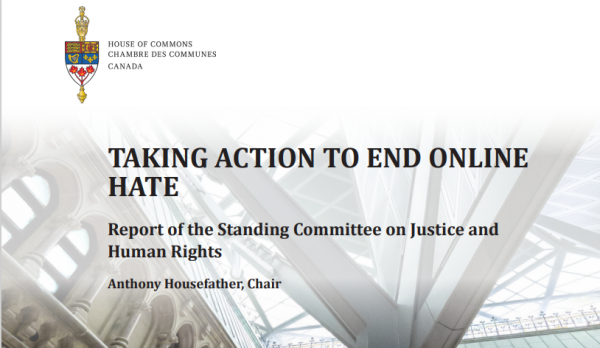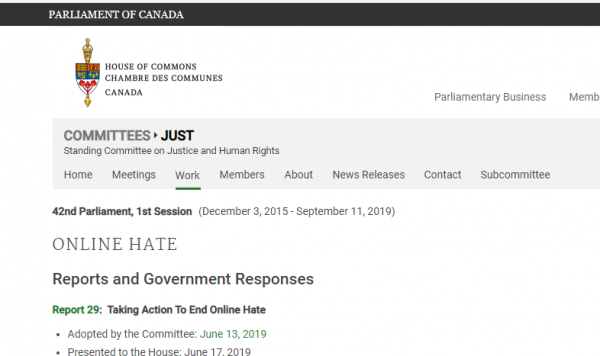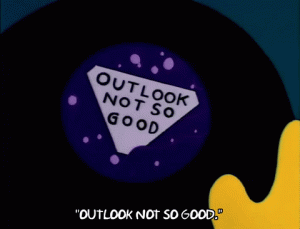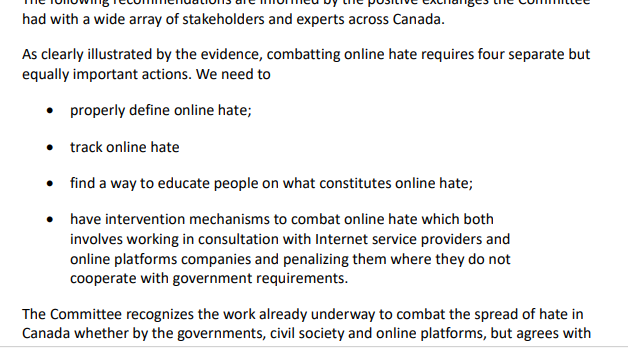

https://www.ourcommons.ca/Committees/en/JUST/StudyActivity?studyActivityId=10543157
BRIEFS SUBMITTED:
Free Speech Submission Brooklyn Fink
Free Speech Submission Nora Loreto
Free Speech Submission Alyssa Blank
Free Speech Submission Organization To Prevent Violence
Free Speech Submission Richard Warman
Free Speech Submission womens LEAF
Free Speech Submission YWCA Canada
Free Speech Submission Canadian Womens Foundation
Free Speech Submission BC Teachers Federation
Free Speech Submission Evangelical Fellowship
Free Speech Submission eQuality Project UOttawa
Free Speech Submission Nancy Ruth
Free Speech Submission Heidi Tworek
Free Speech Submission Ashu Solo
Free Speech Submission Iranian Canadian Congress
Free Speech Submission Sarah Leamon Law Group
Free Speech Submission Council Canadian Muslims
Free Speech Submission Lutheran Evangelical Church
Free Speech Submission Bnai Brith
Free Speech Submission United Church Of Canada
TRANSCRIPTS OF TESTIMONY
Free Speech Evidence Hearing 143
Free Speech Evidence Hearing 146
Free Speech Evidence Hearing 148
Free Speech Evidence Hearing 150
Free Speech Evidence Hearing 151
Free Speech Evidence Hearing 152
Free Speech Evidence Hearing 153
Free Speech Evidence Hearing 154
Free Speech Evidence Hearing 155
Free Speech Evidence Hearing 156
Free Speech Evidence Hearing 157
Free Speech Evidence Hearing 158
June 2019 Parliamentary Report Recommendations
Recommendation 1—Funding for Training on Online Hate
That the Government of Canada increase funding for law enforcement, crown attorneys and judges to ensure that they receive sufficient training and orientation on the importance, and the need to combat online hatred, including being sensitive to complainants
Recommendation 2—Sharing Best Practices
That Justice Canada develop materials and best practices on collecting data and combatting online hate to be distributed to law enforcement agencies across Canada.
Recommendation 3—Addressing the Gap in Data Collection
That the Government of Canada adopt a two-pronged approach to address the gap in data collection that recognizes the fact that members of marginalized groups often feel more comfortable reporting hate incidents and hate crimes directly to civil society organizations which reflect their community rather than law enforcement officials.
Recommendation 4—Tracking Online Hate
That the Government of Canada implement the recommendations regarding the tracking of online hate formulated by the Standing Committee on Canadian Heritage in its report entitled ‘‘Taking Action Against Systemic Racism and Religious Discrimination Including Islamophobia’’, dated February 2018
Recommendation 5—Preventing Online Hate
That the Government of Canada work with the provincial and territorial governments and community organizations who combat hate on appropriate requirements to educate the population as to what on the Internet constitutes hate. Federal organizations such as the Canadian Race Relations Foundation and the Canadian Human Rights Commission should be utilized to provide models of best practices on combatting online hate.
Recommendation 6—Formulating a Definition of Hate
That the Government of Canada formulate a definition of what constitutes ‘hate’ or ‘hatred’ that is consistent with Supreme Court of Canada jurisprudence. It is critical that this definition acknowledges persons who are disproportionately targeted by hate speech including but not limited to racial, Indigenous, ethnic, linguistic, sexual orientation, gender identity, and religious group

Recommendation 8—Establishing Requirements for Online Platforms and Internet Service Providers
That the Government of Canada establish requirements for online platforms and Internet service providers with regards to how they monitor and address incidents of hate speech, and the need to remove all posts that would constitute online hatred in a timely manner
Recommendation 9—Authentication
That online platforms be encouraged to provide optional mechanisms to authenticate contributors and digitally sign content, and couple this with visual indicators signifying that given user or content is authenticated, and provide users options for filtering non-signed or non-authenticated content.
Because expression is sometimes used “to threaten the most marginalized members of our society”42 and considering the grave consequences for its victims, including the infringement of their rights and freedoms, several witnesses were of the view that reasonable restrictions to freedom of expression are needed. Such restrictions are necessary “to protect Canadians from those who willfully promote hate propaganda and seek to radicalize vulnerable individuals.” Several witnesses also noted that “to stop the spread of hate speech”, there is a need for criminal consequences.
“Free speech is not an unbridled right.” When there is a conflict between the rights and freedoms protected by the Charter, they must be balanced. As reiterated during this study, rights and freedoms are subject to “reasonable limits prescribed by law as can be demonstrably justified in a free and democratic society.”
Recognizing the importance of defining hate, some witnesses recommended building upon the parameters defining hatred developed in two decisions of the Supreme Court of Canada, namely Saskatchewan (Human Rights Commission) v. Whatcott and R. v. Keegstra.
Others suggested that we should use the definition of anti-Semitism developed by the International Holocaust Remembrance Alliance. In that sense, Shimon Koffler Fogel from Centre for Israel and Jewish Affairs noted the following:
At present, online platforms remain largely unregulated in Canada. Although Facebook, Google and Twitter already have policies on hate speech or hateful conduct, they indicated that they recognize the need to update and improve their policies on a regular basis. For example, the Committee was informed that Google recently updated its hate speech policy by explicitly prohibiting YouTube videos promoting violence or hatred to justify discrimination, segregation or exclusion based on qualities like age, gender, race, caste, religion, sexual orientation or veteran status. It also decided to remove content on YouTube denying that well-documented violent events, like the Holocaust, took place. Moreover, several platforms have recently taken steps to improve their response to online hate, by updating for example the technology used to remove hateful content and increasing the number of employees dedicated to reviewing content. In that regard, Kevin Chan informed the Committee that Facebook will create an external oversight board by the end of 2019 to help govern hate speech on their platform.
Also, on the topic of removal of hate content by online platforms, some witnesses discussed the concept of “trusted flaggers” which is a concept present in the European Union, where groups specialized in online hate work in collaboration with online platforms and Internet service providers to identify online hate quickly. However, it was noted that this way of working is not the most transparent. As noted from David Matas from B’nai Brith Canada, it seems like “a good system but it can’t replace legislation.… You can’t just say you’ll leave it for the service providers to do, with the help of the NGOs.” Different forms of technology, such as artificial intelligence, could also be used to facilitate the removal of hate content from online platforms.
And in case you think that “conservatives” will stand up for free speech, think again. This is what Andrew Scheer chose to stand up for.
Conservatives reject the proposed measures that are ineffective and will have unintended consequences. But we of course agree that all Canadians should be safe. They should not be subject to calls to violence, hatred or genocide.
.
As Conservative Party Leader Andrew Scheer recently said:
.
“There is absolutely no room in a peaceful and free country like Canada for intolerance, racism, and extremism of any kind. And the Conservative Party of Canada will always make that absolutely clear. This goes to one of my most deeply held personal convictions. I believe that we are all children of God. And therefore, there can be no inferiority amongst human beings. And that equal and infinite value exists in each and every one of us. And I find the notion that one’s race, religion, gender, or sexual orientation would make anyone in any way superior or inferior to anybody else absolutely repugnant.”
.
We must also remember that it was in fact the Liberal Party of Canada who sought to reduce the penalties for advocating genocide to be analogous to those which are meted out for a parking ticket. Thanks to strong advocacy from Conservative Members of this Committee, that
clause was removed from Bill C-75.

